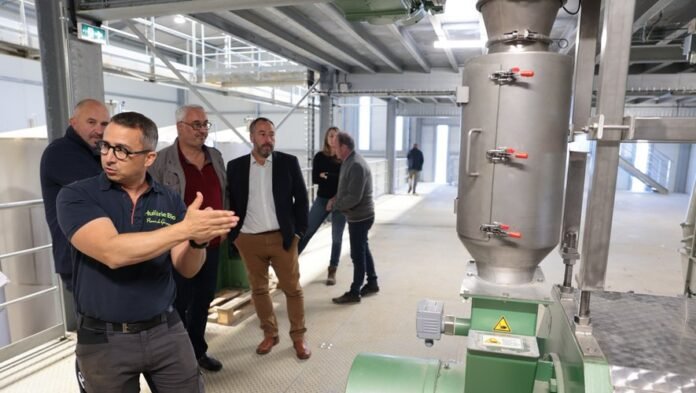The cooperative, which is present in 5 departments, has built in the city of Gimont a building equipped to produce thousands of liters of organic oil to maintain the added value for the members in the region. Time for the visit.
The agricultural cooperative Val de Gascogne has acquired a new oil mill in Gimont to supplement its existing equipment in Cologne. Ultimately, it plans to triple its production of organic oil.
On the heights of the activity zone Fourcade, the white and ochre-coloured building of 1,400 m2 is already finished, but the oil mill will not start production until next January. “The oil mill in Cologne, built in 2012, can only process 2,000 tons of crushed seeds,” explains the deputy general manager, Jean-François Deneys. Here we are at 4,500 tonnes, even 6,000 tonnes. 90% of it is sunflower. The rest consists of flax and canola. »
The output of the Gimont oil mill will also be higher in protein than before, thanks to a new manufacturing process.
Main tool
In addition to oil, this equipment also produces cakes, from pomace, to livestock. The contributions come mainly from Gers and Haute-Garonne. Around 300 members of Val de Gascogne supply organic seeds.
To build this tool, Val de Gascogne spent almost 4.5 million euros. A significant investment, but one that allows the cooperative to diversify its production and meet buyer demand.
“The organic oil brands that already work with us were waiting for a new tool,” emphasizes the DGA.
Oliemøllen delivers only in bulk, without packaging.
Located in the heart of the production area, it is located near the RN 124, an ease for trucks that come to pick up oil or oil cake, or for grain deliveries, specifies Jean-Louis Valadié, the general director of Val de Gascony. One of the advantages of this oil mill, where machines can shell the seeds, is that they can be used for human consumption! “The recovered cakes can then be used for, for example, cereal bars,” he adds.
5,000 to 6,000 liters of sunflower oil per day
The seeds arrive at the oil mill through a pit, from where an auger sends them to silos. A cleaning and sorting process follows, which leads to the oil mill’s 3 crushers. The machinery can deliver 5,000 to 6,000 liters of sunflower oil per day, stored after various filtrations in the 6 30,000 liter tanks in the huge room which takes up most of the building.
Largely automated, installation only requires 2 technicians to start, compared to just one in Cologne. This number can gradually increase to 4 or 5. A laboratory makes it possible to analyze the quality of finished products on site.
“There are not many oil mills with this capacity in France,” analyzes Jean-Louis Valadié. The primary interest of our members is to preserve the added value of Gers agricultural products in Gers. It is a necessity to maintain a solid agriculture, especially after the crisis that ecology experienced. »
A website in development
The municipal society, 3CAG, also looks very positively at the installation of “a local sector, which is also organic, which will make it possible to produce the necessary seeds a few km from here,” assures Pierre Olivier Planchand, the vice-president. for the economic life of 3CAG. This also means less pollution with the reduction of truck transport, and this preserves an outlet for our farmers: We will not go to the ends of the earth to buy the seed! »
Val de Gascogne has also reserved significant land, this time within the perimeter of the Fourcade area, close to the oil mill, to build new silos to replace those on the old Toulouse road. Future silos should also offer new possibilities.
Currently, the oil mill area is still under construction. On the two interior floors, some of the machinery that will process the seeds needs to be assembled or connected. It will also be necessary to cover the roof of the building with solar panels. “Part of the energy produced will be used directly on site,” explains the Deputy Director General, Jean-François Deneys. The rest will be donated to the network. »
